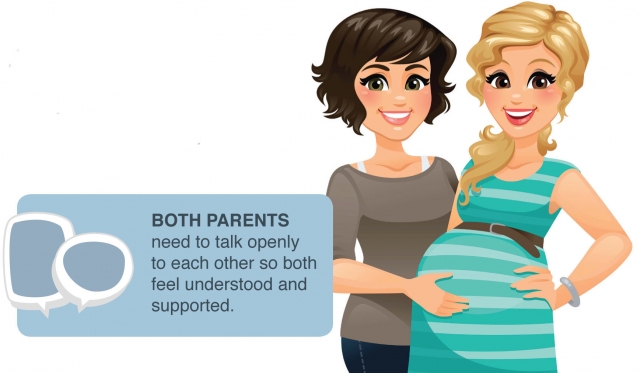T2P: Transition to Parenthood

Creating resources and information with and for young adults with a mental health challenge, to support their transition into parenthood. familysmart.ca
You are having a baby and you have experienced a mental health challenge in your life. Many people have mental health concerns and parent every day. This resource was written for you by new parents who also have a mental health challenge and want to offer you a few ideas that have helped them.
Moms are important and your mental health matters during pregnancy just like your physical health. Make sure all the people involved in caring for you have all the info they need to do this well. It is really important.
Talk to your Doctor/Midwife about your mental health challenges, history, meds, and any treatment happening now (or recently). If your partner has, or has had, mental health challenges, it is important that they also share their history and any concerns or questions they might have with your Health Care Provider. Both parents matter.
Talk to a Genetic Counsellor if you are interested in learning more about the causes of your and/or a family member’s mental illness or if you have any concerns about potential risks for your baby. See resource list for contact info.
Ask your Doctor/Midwife if there is anything that you need to know about your mental health and prenatal care. Talk with your doctor before changing or stopping any meds, make an informed decision. If you do change your meds, make sure to tell those around you about the changes.
Ask your Doctor/Midwife to include a mental health check at your monthly pre- and post-natal appointments.
Talk to your Counsellor/Therapist and tell them you are pregnant. Have a conversation and talk about what you might need to think about and do to take care of your mental and physical health during pregnancy, and after.
Talk to your partner and/or support person about the social, emotional, physical and economic changes you are experiencing.

Taking care of you and becoming a parent
Becoming a parent is a big deal! It is exciting but can also feel overwhelming to have a baby and raise a child. Creating a support system while you are pregnant is a great idea for every new parent and can really help if you are starting to struggle with your mental health. We all need people in our lives to help us out and it is important to make sure there are people who know you, who can help with baby and that you can talk to about how you are doing and what you need.
People love to help. Let people help.
Eat as well as you can. Get outside, when possible. Tell someone right away if you need help. You are important and it is okay to need help.
People you can talk to: family doctor, midwife, public health nurse, psychiatrist, family, and friends.
Managing your mental health while becoming a parent requires support
Here are some resources to help:
The BC Reproductive Mental Health—Assesses, treats and supports women and their families who are dealing with mental health challenges. Information, support, and resources on depression, anxiety, psychosis, bipolar. www.reproductivementalhealth.ca | 604-875-2025
Healthy Families BC—Tips and tools to help you from planning to pregnancy to becoming a family. www.healthyfamiliesbc.ca/parenting
Pregnancy and Outreach Programs—Available across BC to provide free prenatal and early parenting support to women who experience health or lifestyle challenges during pregnancy, birth, and the transition to parenting. www.bcapop.ca
Genetic Counselling—A free clinical service discussing the genetics of mental illness and how this affects your family, no referral necessary. www.keltymentalhealth.ca
Pacific Post Partum Support Society—Support through telephone calls, text messages and support groups for mothers and their families experiencing post partum distress, depression and anxiety. www.postpartum.org | 1-855-255-7999
BC Partners for Mental Health & Substance Use Information—A group of seven leading provincial mental health and addictions nonprofit agencies working together to help people better prevent and manage mental health and substance use problems and live a healthier life. www.heretohelp.bc.ca
Child Care Resource and Referral Services— Childcare referrals, resources and support to parents in over 400 communities across BC. www.childcareoptions.ca
Call 811 or visit www.healthlinkbc.ca for free, non-emergency health information for any one in your family, including mental health information. 24 hours a day.
Call your Local Crisis Line at 310-6789 for information or if you just need someone to talk to. These phone lines aren’t only for people in crisis. 24 hours a day.
Asking for help with your mental health does NOT mean your baby will be taken away from you. Everything possible is done to keep parents together with their children. In the event that a parent becomes too unwell to care for their children, a Ulysses Agreement can be useful. It is an advance planning document which parents complete when “well” with their informal and formal supports to direct care of their children, should they become ill. Visit: www.bcss.org/ulysses.
About the author

FamilySmart provides information, resources, navigation assistance, and support to families or caring adults of children, youth, or young adults with mental health and/or substance use challenges. Visit www.familysmart.ca.
